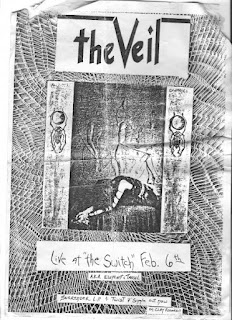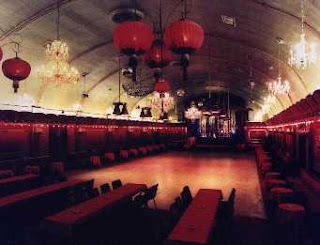Martin from Beyond the Implode with tales of drunken dancing and snogging from Dunstable to St. Petersburg. Don't think we've met yet, despite both having spent time in dodgy Luton clubs, New Cross Venue, the Swan in Stockwell, Megatripolis and doubtless other places.1. Can you remember your first experience of dancing?The earliest was probably throwing myself around to the theme tunes of TV shows like "The Professionals"and "Weekend World". You need a good, driving, dynamic theme tune to injure yourself to, and "Weekend World" ticked all the boxes with its crashing guitar blitz, tense drumming and moody organ. I was quite disappointed, years later, when I found out that particular piece was actually recorded by a '70s
prog rock band called Mountain - I preferred imagining that it was knocked up by some eccentric 'TV jingle expert', frantically chain-smoking and directing a school-aged rock group in the London Weekend Television studios.
This primitive slam dancing would go on for weeks until I had permanent carpet burns and severe bruising, or til my dad kicked me out of the living room. After that, it was probably doing the Adam & The Ants "Prince Charming" dance at my (much) older sister's wedding reception in 1981 - well, until I realised that a bunch of pissed-up, middle aged Irish relatives were staring at me, causing me to bottle out and hide under a table.
But my first real communal dancing memory was a girl's birthday party. We were all about 7, I was wearing my MY SISTER WENT TO MALTA AND ALL I GOT WAS THIS LOUSY T-SHIRT t-shirt and me and some snot-nosed girl called
Sheilagh were grooving to rubbish like "Young Guns", "D.I.S.C.O" and the one that went "Hands up, baby hands up, gimme your heart gimme gimme..." etc.
2. What’s the most interesting/significant thing that has happened to you while out dancing?I can't identify one most interesting / significant thing - for me what was significant was the fact that, when I was younger, I considered myself a right
ming-
mong who'd never be able to cut it on any
dancefloor. So just dancing at all without incurring any fatal consequences or humiliation was quite nice.
I don't really take dancing that seriously, I tend to arse around doing 'rave
spaz' hand movements. I picked up a few tips on the
dancefloor over the years, though. Some woman told me that men should dance with their knees rather than their hips, as it reduces jerky shoulder movements. I don't know if she was having me on, but as a result I've danced like M.I.A ever since. Also, if you do that '70s disco thing where you form 'V'-signs with your fingers, and then drag them across your eyes, it's a good way of reassuring people that you don't spend all your time practising in front of a mirror and that you're not going to start pelvic thrusting all over their legs.To be honest, as long as it's the right vibe with
the right people, I could dance at a Norwegian country and western night and have a good time.
3. You. Dancing. The best of times…A fair few. There was the time I went to see The Damned and the Anti-Nowhere League at the Astoria in1994. I'm not really a big fan of either band, but that was such a laugh, like splashing through a lake of spilt beer at a medieval public execution.
Spoddy kids across the globe owe a debt of gratitude to Sid Vicious for inventing pogo dancing, anyone can do it and all it takes is a bit of basic stamina. I liked the unspoken code of honour at punk gigs, like if someone slipped over and hit the deck, everyone would clear a space around them and help them back up to their feet. There was a fat
psychobilly bloke down the front of the gig, whose 'dancing'
solely consisted of violently lashing his fists out in front of him, sending the occasional skinny punk reeling. At
some point I just thought, "Sod it, it can't hurt THAT much", and gleefully flung myself into his path. He whacked me in the chest and I went flying, but I was too busy laughing to feel any pain. I used to love going to
Slimelight too, I think I had some sort of affinity for dancing to
EBM (which I hardly ever listened to at home) because I ended up getting snogged by random strangers on a regular basis.
I did my first vial of poppers there. I've never been a heavy drugs user, but I liked
amyl nitrate because it gets straight to the point and makes you feel like your heart's about to come drilling out of your chest 'Manic Miner' style - you also avoid hours of talking shit about the hidden meanings of Smiley Culture lyrics. My favourite night at
Slimelight was when I 'pulled' (or 'was pulled' more accurately) by some punk girl who later vomited all over herself at Angel tube station. She was barking mad but very sweet. Bizarrely, I still wonder how she's doing these days.
 Megatripolis
Megatripolis at Heaven was good fun, like running around inside a techno LSD carny. But one of my favourite nights out was New Year's Eve '98, me and my flatmate Kev had ended up in a pub in
Edgware called The Railway. We were doing the standard, skint "This is such a rip-off, what a crap night" moaning when some incompetent DJ came on and started (very poorly) mixing "Renegade Master", a pile of big beat records, Run
DMC etc. The whole pub suddenly transformed into the best nightclub in the world, we were rolling around the sticky carpet, trying to '
breakdance' with local bikers, people grabbing the
DJ's microphone and giving surreal shout-outs to their bedridden grandmas...just good, dirty chaos all round! The whole thing fizzled out around 4am when the police turned up, the last thing I remember was a skeletal guy in nerdy glasses, a Santa hat and his boxer shorts, dancing with one of the barmaids to "Last Night a DJ Saved My Life" on the pool table and waving a
poolcue around like a sword, while a couple of incredulous cops tried to get the DJ to sober up enough to unplug his decks.
I haven't linked dancing to sex yet - in 2002, I was down the
Stockwell Swan with my then girlfriend. I've never been bewitched by someone dancing before but she completely blew me away, she seemed to transform herself into a snake goddess and did this odd dance in the middle of the floor. There were blokes craning their necks to get a look, it was something else,
Ididn't dare go near her in case I broke the spell. I'm not making this up, and I wasn't on drugs. I just stood by the side of the
dancefloor with my jaw scraping the floor. I remember telling myself, "Lap this up and enjoy every minute of it, because special moments like this don't last forever, and one day it'll all be gone" - and sure enough, me and the
cowsplit up in 2003.
4. You. Dancing. The worst of times…I remember an extremely unpleasant night in
Ritzy's nightclub in
Dunstable, which was situated in a shopping precinct - it was just a commercial club, playing chart music and a bit of house. I can't even remember why we'd bothered going there, but it was a complete nightmare. Groups of blokes who hadn't managed to pull were just roaming around beating the shit out of anyone they took a disliking to. Somebody got glassed in the toilet and then it all erupted, with two sets of blokes clashing, I can still remember seeing puddles of blood all over the floor and smeared up one of the cubicle doors. Outside, some bloke had collapsed in a heap on a metal bench and a group of lads were surrounding his comatose body, gobbing all over him and shouting stuff like "piss on the fat cunt".
There was a similar night in Mirage in
Luton. The upstairs used to be for 'alternatives', whereas the downstairs area was a dance area. It operated on a kind of segregation basis, as if you had this '
peaceline' running across the back stairwell, so the punks/ goths / indie kids and 'straights' didn't come into contact with each other. It's funny to think these(mostly) gentle, polite kids were upstairs listening to grunge and Rage Against the Machine wailing about fucking up the system, while, downstairs (where we ended up one night) some squaddie would be kicking
bejayzus out of another bloke and girls would be decking each other to "Saturday Night" by
Whigfield.
Worst was last year when I went to Russia with some girl and it transpired she was actually on the rebound. I decided to get as drunk as possible, hoofed back a bottle of
Russki Standart Platinum, and set out to dance myself into oblivion in some
seedy Euro-techno club. Instead I ended up falling over, landing on my thumb and leg and having to be carried outside by her and her friends. The next day I had a nearly flight back to London, but when I got to
Heathrow my hand had swollen up and I couldn't actually stand, so I had to be helped to arrivals by the cabin crew, which was highly embarrassing. I
ended up in
Whittington Hospital being X-
rayed, patched up and prescribed a course of anti-
flams and hobbling back home (it took me half an hour to walk a normal 10 minute distance). It was kind of full circle back to where I started, crashing into things and getting injured.
5. Can you give a quick tour of the different dancing scenes/times/places you’ve frequented?Not really, it's kind of scrambled, but as a rough sketch: 1992-1994, London punk / riot
grrrl bands; 1994-1996 -
Megatripolis for techno,
Lazerdrome in
Peckham for jungle, Venue, New Cross, for indie /
punk bands, Goldsmiths Tavern, New Cross, for the odd
anarcho band, and
Slimelight for goth / industrial.Ever since then, various clubs, ranging from outright commercial cattle markets to excellent
dancehall nights like Kevin Martin's and
Loefah's BASH in
OldStreet.
6. When and where did you last dance?That tendon-ripping night in St
Petersburg, unless you count coolly nodding and shuffling (A BIT) at a grime night in East London a while back.
 7. You’re on your death bed. What piece of music would make your leap up for one final dance?
7. You’re on your death bed. What piece of music would make your leap up for one final dance?
It'd have to be "Body of an American" by the Pogues, a real mosh out way to go, preferably accompanied by streams of Talisker and (despite having quit earlier this year) a last Marlboro Light. Oh, and a couple of ex-girlfriends dabbing their eyes with a hankie as I drop to the ground and convulse around a bit at the end.
All questionnaires welcome- just answer the same questions and send to transpontine@btinternet.com (see previous questionnaires)













